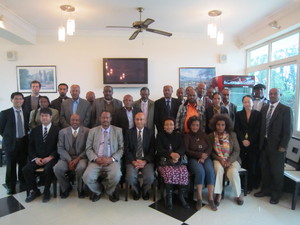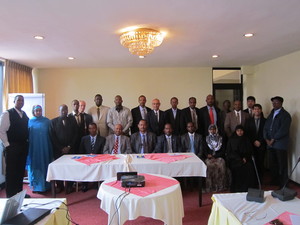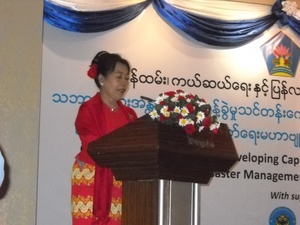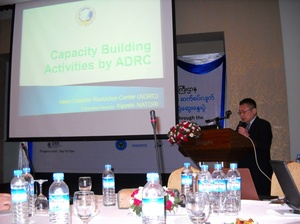29 July to 3 August 2013 (Addis Ababa, Ethiopia)
In collaboration with the Intergovernmental Authority on Development (IGAD), IRP/ADRC facilitated a back to back workshop on disaster recovery planning for Ethiopian officials (29-31 July 2013) held at Dreamland Hotel in Bishoftu and for Somali officials (1-3 August 2013) held at Panorama Hotel in Addis Ababa. Both workshops were part of the three workshops intended for the Horn of Africa under the EC-funded project "Strengthening Region-based Capacities in Disaster Recovery Planning", which is implemented by UNISDR through the IRP. The third workshop is planned for South Sudan officials to be held in Juba on 25-27 September 2013. These workshops are aimed at creating a pool of recovery experts in the region as well as build a standby capacity in IGAD. Achieving this objective entails that support can be expected by any country in the region desiring technical assistance for disaster recovery planning.
 About 25 officials from Ethiopia and 20 officials from Somalia participated in the first and second workshop, respectively. The participants were high-level, coming from different ministries of the government with knowledge and background on disaster risk management and long-term recovery. In addition, representatives of international organizations, specifically UNDP, ILO, WHO, JICA, and African Center for Disaster Risk Management (ACDRM) also participated to make sure that the workshop encapsulates local knowledge, regional experience, and international expertise. With Ethiopian government hosting the back to back event, H.E. Ato Mitiku Kassa, State Minister for Disaster Risk Management, came at the opening of both workshops. Additionally, H.E. Said Yousuf Noor, Somali Ambassador to Ethiopia and Permanent Representative to the African Union, came at the first day of the workshop intended for the Somali government officials.
About 25 officials from Ethiopia and 20 officials from Somalia participated in the first and second workshop, respectively. The participants were high-level, coming from different ministries of the government with knowledge and background on disaster risk management and long-term recovery. In addition, representatives of international organizations, specifically UNDP, ILO, WHO, JICA, and African Center for Disaster Risk Management (ACDRM) also participated to make sure that the workshop encapsulates local knowledge, regional experience, and international expertise. With Ethiopian government hosting the back to back event, H.E. Ato Mitiku Kassa, State Minister for Disaster Risk Management, came at the opening of both workshops. Additionally, H.E. Said Yousuf Noor, Somali Ambassador to Ethiopia and Permanent Representative to the African Union, came at the first day of the workshop intended for the Somali government officials.
 During the workshops, various aspects of recovery planning were discussed. In particular, options and strategies to "build back better" after long-drought and heavy flooding were explored in order to address the challenges that are expected in the recovery process. Although IRP/ADRC served mainly as facilitators, experts from WHO, ILO, and UNDP came to the workshop to share their expertise and experiences from their respective activities in the region. The following observations came out from the discussions. Firstly, there has been a paradigm shift in dealing with disaster in the region from "crisis management" to "risk management". This new paradigm embraces the importance of pre-disaster recovery planning and views disaster management in broader and holistic perspectives. Secondly, the disaster risk management activities initiated by the governments are aligned with the Hyogo Framework for Action (HFA). In other words, the governments have localized and reported updates on the priorities for action identified in the HFA. Finally, there have been ongoing initiatives by the governments on integrating disaster recovery planning in disaster risk management and sustainable development. One example is the DRM Strategic Program and Investment Framework (DRM-SPIF) of the Government of Ethiopia. The DRM-SPIF is an instrument that guides and prioritizes investment towards full operationalization of the DRM policy. Among a number of prioritized areas is the disaster recovery planning so that communities can "build back better" and become more resilient in future disasters. The lessons on recovery, as compiled by IRP/ADRC from various experiences around the globe, provided an additional input to build on the existing government initiatives. The key output of the workshops is the consolidated strategic recommendations for recovery plan for drought and flood.
During the workshops, various aspects of recovery planning were discussed. In particular, options and strategies to "build back better" after long-drought and heavy flooding were explored in order to address the challenges that are expected in the recovery process. Although IRP/ADRC served mainly as facilitators, experts from WHO, ILO, and UNDP came to the workshop to share their expertise and experiences from their respective activities in the region. The following observations came out from the discussions. Firstly, there has been a paradigm shift in dealing with disaster in the region from "crisis management" to "risk management". This new paradigm embraces the importance of pre-disaster recovery planning and views disaster management in broader and holistic perspectives. Secondly, the disaster risk management activities initiated by the governments are aligned with the Hyogo Framework for Action (HFA). In other words, the governments have localized and reported updates on the priorities for action identified in the HFA. Finally, there have been ongoing initiatives by the governments on integrating disaster recovery planning in disaster risk management and sustainable development. One example is the DRM Strategic Program and Investment Framework (DRM-SPIF) of the Government of Ethiopia. The DRM-SPIF is an instrument that guides and prioritizes investment towards full operationalization of the DRM policy. Among a number of prioritized areas is the disaster recovery planning so that communities can "build back better" and become more resilient in future disasters. The lessons on recovery, as compiled by IRP/ADRC from various experiences around the globe, provided an additional input to build on the existing government initiatives. The key output of the workshops is the consolidated strategic recommendations for recovery plan for drought and flood.
(2013/8/12 14:30)



